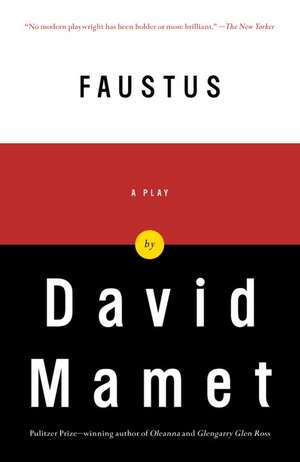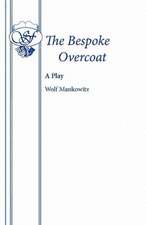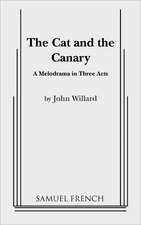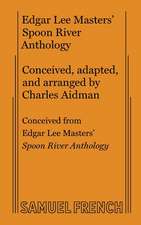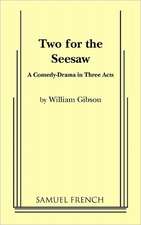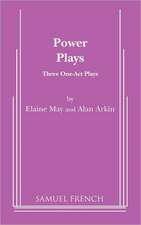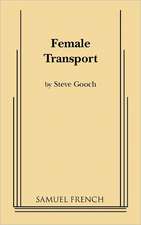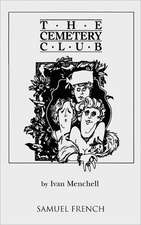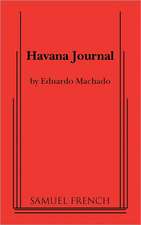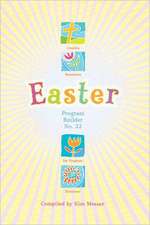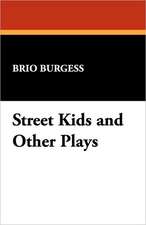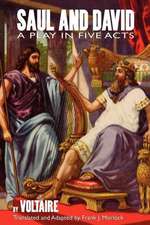Faustus
Autor David Mameten Limba Engleză Paperback – 30 apr 2004
Mamet’s Faustus—like Marlowe’s and Goethe’s before him—is a philosopher whose life’s work has been the pursuit of “the secret engine of the world.” He is also the distracted father of a small, adoring son. Out of the clash between love and intellect and the fatal operation of Faustus’ pride, Mamet fashions a work that is at once caustic and heart-wrenching and whose resplendent language marries metaphysics to conman’s patter. A meditation on reason and folly, fathers and sons, and a breathtaking display of magic both literal and theatrical, Faustus is a triumph.
Preț: 111.63 lei
Nou
Puncte Express: 167
Preț estimativ în valută:
21.37€ • 23.22$ • 17.96£
21.37€ • 23.22$ • 17.96£
Carte disponibilă
Livrare economică 31 martie-14 aprilie
Preluare comenzi: 021 569.72.76
Specificații
ISBN-13: 9781400076482
ISBN-10: 140007648X
Pagini: 112
Dimensiuni: 133 x 204 x 8 mm
Greutate: 0.12 kg
Editura: VINTAGE BOOKS
ISBN-10: 140007648X
Pagini: 112
Dimensiuni: 133 x 204 x 8 mm
Greutate: 0.12 kg
Editura: VINTAGE BOOKS
Notă biografică
David Mamet was born in Chicago in 1947. He studied at Goddard College in Vermont and at the Neighborhood Playhouse School of Theater in New York. He has taught at Goddard College, the Yale Drama School, and New York University, and lectures at the Atlantic Theater Company, of which he is a founding member. He is the author of the plays The Cryptogram, Oleanna, Speed-the-Plow, Glengarry Glen Ross, American Buffalo, and Sexual Perversity in Chicago. He has also written screenplays for such films as House of Games and the Oscar-nominated The Verdict, as well as The Spanish Prisoner, The Winslow Boy, and Wag the Dog. His plays have won the Pulitzer Prize and the Obie Award.
Extras
ACT ONE
At rise, we see the portico of FAUSTUS's home. Large double doors open onto a room hung with tinsel and streamers, a party scene gotten up as a fantasy.
FAUSTUS's wife is involved in decoration. FAUSTUS enters and looks around. Pause. He holds a sheet of paper in his hand.
FAUSTUS: It seems a very dream.
WIFE: It is a dream. Delightful, as it is temporary.
FAUSTUS: Temporary.
WIFE: How otherwise?
FAUSTUS: To what do you refer?
WIFE: Have I mistook you?
FAUSTUS: What is it you indict of transience?
WIFE: Of transience-the décor.
FAUSTUS: The décor, indeed.
WIFE: Which, you remark, will serve but the day's brief turn . . .
FAUSTUS: . . . of course . . .
WIFE: . . . divert the child, and then . . .
FAUSTUS: How is the boy?
WIFE: He would be thrilled to find you at this unaccustomed hour. What has released you . . . ?
FAUSTUS: . . . where is Fabian . . . ?
WIFE: I believe he marshals the festivities. I beg your pardon, are you anxious for his news?
FAUSTUS: What news?
WIFE: Today is Friday . . .
FAUSTUS: Yes . . .
WIFE: He generally brings the gazette. Are you cold, Faustus? The day is cold.
FAUSTUS: The chill livens the mind. Life grows in the cold. Does it not?
WIFE: It grows however you should bid.
FAUSTUS: My bidding cannot alter its growth.
WIFE: But it shall affect how I perceive it.
FAUSTUS: I believe I have completed my work. (Of the paper in his hand) Here is the long-sought, un-sought, oft-rejected, indeed, denied, yet, insistent, true conclusion. Which like shy love, like unremarked merit was found to've been present all along. The essence of the enterprise, which, but humility, which, I will not say Suffering, but trial, fatigue, and disillusionment chastised me sufficiently to grasp.
WIFE: You have completed your work . . .
FAUSTUS: I believe I have found not the conclusion I sought, but, perhaps, the truth, or the shadow of the truth- subject, I believe, to but slight revision, I see the end of my work.
WIFE: Your most sanguine of expectations could not put the end sooner than years.
FAUSTUS: So indeed I thought.
WIFE: Then how . . . ?
FAUSTUS: It rests in the rendition of the false. Which, like a bridal veil, could not be lifted by force-solely through devotion. (He hands her the paper.)
WIFE: I cannot follow it. The argument's beyond me.
FAUSTUS: Then take me on faith, and pardon me.
WIFE: . . . for what conceivable sin?
FAUSTUS: . . . to leach attention from another's feast. How is the child?
WIFE: He loves you. You repeat yourself.
FAUSTUS: Then you may claim a forfeit.
WIFE: Your soul.
FAUSTUS: Have I not given it?
WIFE: How can you live without your soul?
FAUSTUS: It flourishes without me. While within it was bound by my vice, and vanity, each step for its supposed cultivation only brought it blight. Since consecrated, I observe it to grow strong. Its reproofs are of the most gentle, and its instructions delight.
WIFE: What has it taught you?
FAUSTUS: To yield, to wait, to hope, to believe. In fine, it has taught gratitude.
WIFE: Smile, then, on your faults, as those do who love you. For all must wax and wane.
FAUSTUS: Indeed?
WIFE: Must I quote you the Moon?
FAUSTUS: Oh, simple and good soul, are you not my salvation?
WIFE: As you are mine.
FAUSTUS: Who counted himself honored merely to be your support.
WIFE: Do we not profit, nay, thrive, nay, delight in your wisdom?
FAUSTUS: It is derivative.
WIFE: Must not all wisdom be?
FAUSTUS: Must it?
WIFE: As it derives from God. Our excellence is not in Creation, which is the Lord's, but in our humble wonderment.
FAUSTUS: Which you indict me of?
WIFE: I do.
FAUSTUS: You honor me.
WIFE: I must see to the boy.
FAUSTUS: Stay.
WIFE: He is somewhat overborne by the excitement.
FAUSTUS: Stay. This one moment. Anchor me.
WIFE: This may suffice. (Hands him a sheet of paper)
FAUSTUS: What is it?
WIFE: His gift to you.
FAUSTUS: 'Tis his day for gifts.
WIFE: Does he not long to pace you in all things? Who are his god? You fret, he frets; you work, he mimics you, you prepare a gift, so must he . . . and his mind, formed like yours, revolves, ever on the one planetary theme.
FAUSTUS: Whose name is?
WIFE
wife: He pines for you.
FAUSTUS: . . . you give him to understand . . . my work . . .
WIFE: Which names his enemy, but cannot diminish his longing.
FAUSTUS: My sweet son.
WIFE: We have all fretted.
FAUSTUS: Fretted for me?
WIFE: With you, say, rather-with you-in your seclusion.
FAUSTUS: Yes, I know.
WIFE: Now know the extent. Read: (She gestures at her sheet of paper.)
FAUSTUS: (Reads)
"Heavy heavy the hired man
Weary, how weary the willing hand
One for the Heart, One for the Head
One for the Lad who tarries abed . . ."
He stays abed . . . ?
WIFE: . . .'tis but the figure.
FAUSTUS: (Reads)
"Three swift swallows in the summer sky . . .
Gone in the Twinkling of an eye.
What mystic light, illumes the night
A father's care . . ."
(Pause) This is the Son's love. Full-grown man cannot compass it. But in nostalgia for the infant state . . . that hopeless love of the omnipotent. Sad, savage longing.
WIFE: Sad?
FAUSTUSs: Is it not?
WIFE: Read to the end . . .
FAUSTUS: I recollect, now, for the one half-instant, now-that brief, child mind, when all good dwelt in self-consuming worship. How might a man deserve it? (Pause)
WIFE: One may but treasure it. Come to him.
FAUSTUS: In the one moment. My hand to my heart-
WIFE: Then I must go.
FAUSTUS: Again, is he unwell?
WIFE: But overtaxed, by the oncoming celebration.
FAUSTUS: Go then, be thou my emissary. Relate my delight at his composition, and offer th' appropriate salutations, as fitting one scribe to his brother upon this festive, so on . . . Bid him allow me to compose myself, after my labor, and I come to him complete.
WIFE: Complete, and abandoned to the festivities.
FAUSTUS: Like a newly convinced addict.
WIFE: And our profound congratulations on the completion of your work. I lack the words . . . might you take them for said?
FAUSTUS: And put so prettily.
WIFE: Where?
FAUSTUS: In your visage-see to the child.
(She exits. FAUSTUS looks at the paper.)
FAUSTUS: "One for the heart, one for the head, one for the lad who tarries abed . . ." Poor child. His work now complete, he, like his father, is cursed to begin again. For, envision a balance: as much as the work partakes of divine afflatus. To that same extreme one must again tempt, cajole, entreat, and importune the gods. The artist weathercock now ratifying north, now northwest, and we serially nod delight at each fresh revelation. Hush, he is working; hush, he is done. A decade's labor. I have said A, now I say B. Is this clarification? Or Repentance. See: our poor petted Sisyphus, watches his labor now devolve from him. Both fame and failure apportioning but self-revulsion. (Pause) The mind is a mill which can incessant turn, til its mere operation focus the stress inward and the stones grind themselves to dust.
(Enter the friend)
FRIEND: This is a curious greeting for an anniversary.
FAUSTUS: Fabian.
FRIEND: How is the boy?
FAUSTUS: I was to go to him-I have forgotten. Lord, hear my plea. My sin is great, pardon my self-absorption.
FRIEND: So may we indict any man.
FAUSTUS: And myself the chief malefactor.
FRIEND: Why?
FAUSTUS: The greater the gift the greater the shame in malfeasance, e'en here I sin in pride, how can you stomach me?
FRIEND: Doth not contrition mitigate your pride?
FAUSTUS: It is a counterfeit. Like the rich, I trust to the soft brush of rhetoric, to rasp from myself the stench of crime.
FRIEND: Shall nothing cleanse you?
FAUSTUS: Mine is the Sin of the Confessional. Of one whose depth of contrition, howe'er impersonated, nay, howe'er felt, may never plumb the depth of his duplicity. I am a fraud. Whose prayer is not thanks, but anxiety: let me be played off, e'er I am discovered.
FRIEND: Not today, not today, good Master, which is a Feast day, when we are bid to drink, to rest, to celebrate.
FAUSTUS: What of philosophy?
FRIEND: And let philosophy succor itself, in whate'er it may consist.
FAUSTUS: While we?
FRIEND: Grope blindly, as your Honor knows, in hope of that good morsel, heady liquor, or compliant wench.
FAUSTUS: Do we then, like the beasts, live solely for repletion?
FRIEND: On the which note might I dare importune you for refreshment?
FAUSTUS: Do I construe you to mean, you find philosophy less than a noble task?
FRIEND: I've seen, these many years, it seems to please you when, at close of day, you have matched this word to that feeling.
FAUSTUS: You find it an unworthy pastime?
FRIEND: Who am I to balk another of his freak? I knew a villain, said he lived to count the stars. Each darkness found him, with his pen and ledger, out of the house, happy as a grig.
FAUSTUS: . . . it pleased him.
FRIEND: He called it his life's work.
FAUSTUS: To number the stars.
FRIEND: So he said. Until that day he wandered out of bounds into a neighbor's copse, and was killed by the gamekeeper.
FAUSTUS: The gamekeeper mistook the fellow's errand.
FRIEND: Oh no, he reckoned it aright.
FAUSTUS: How so?
FRIEND: Each night, my friend took up his ledger and trod out, it was to lie with the gamekeeper's wife.
FAUSTUS: Aha.
FRIEND: And daughter.
FAUSTUS: I see your man was a prodigy.
FRIEND: Sir, you don't know the half of it.
FAUSTUS: Which distinguishes me from the gamekeeper's wife.
FRIEND: . . . and daughter . . .
FAUSTUS: . . . as you said.
FRIEND: . . . and son, for all we know.
FAUSTUS: . . . so much is hidden from us . . . (Pause) You balk me of my prerogative melancholy.
friend: You have enrolled me as your foil. Permit me my turn. Again, might you supply a drink, to a traveler, come from the cold unfeeling world?
FAUSTUS: Ah, have you brought the journal?
FRIEND: The journal, no.
FAUSTUS: You have not?
FRIEND: But is it Friday?
FAUSTUS: Returned, with its noted regularity.
FRIEND: I do not have the journal, no.
FAUSTUS: Oh, my friend, you are certainly damned to Hell. Heaven must shun you, as you use its gifts so ill.
FRIEND: What gift?
FAUSTUS: Mendacity. Give me the gazette.
FRIEND: I do not have it.
FAUSTUS: Give it in any case.
FRIEND: I would not vex you on this party day.
FAUSTUS: I warrant you I shall survive what your reluctance indicates as their displeasure.
FRIEND: They have, we must note, historically praised you.
FAUSTUS: As they praise the mother of the bride, to mask their own concupiscence. What is their praise, they are, as dolt schoolchildren bent on their sums, they round their inclusivities, into the most proximate low error. Their censure and praise are one. But th' extorted approbation of the ignorant. Give me sufficient ink and paper, I'll forge you that report making a dog's bone savior of the world.
FRIEND: Do you shun fame?
FAUSTUS: I accept fame. I seek knowledge.
FRIEND: Would you then publish your work anonymously?
FAUSTUS: Yes. I enjoy the mention of my name, that permitted self-voyeurism.
FRIEND: Which is but greed for fame.
FAUSTUS: Discovered, I confess. Am I a libertine? A thief? A murderer? I covet fame. And, like the criminal I plead first, what have I done, and next, who suffered? Yes. I would have fame. For my works, and fame surpassing them, til Faustus's renown shines free of accomplishment. Read me the journal.
FRIEND: Read it to you?
FAUSTUS: The honest man-must in good modesty avert his gaze. It is a disgraceful proclivity.
FRIEND: The journals.
FAUSTUS: Yes.
FRIEND: To write them?
FAUSTUS: To read them. To write them is a crime against nature. What do they say of me?
FRIEND: Pray, delay it past this festive time. How is the boy?
FAUSTUS: He has a cold upon the chest. Read the report to me.
FRIEND: (Takes out a newspaper and reads) . . . that . . .
FAUSTUS: . . . please . . .
FRIEND: . . . my eyes as you know are weak.
FAUSTUS: . . . supply the lack with concentration.
FRIEND: "Our celebrated polymath, our local solon, champion, philosopher."
FAUSTUS: . . . and, so, enlarge the epigram: even a dead pig finds a truffle. Read on . . .
FRIEND: "Faustus: our premier: physician, philosopher, savant-scientist . . ."
FAUSTUS: A linguistic supererogation . . .
FRIEND: " . . . having labored for," et cetera . . .
FAUSTUS: . . . but I abjure pedantry . . .
FRIEND: "Proceeds, our sources inform us . . ."
FAUSTUS: . . . who might these sources be?
FRIEND: Friends of yourself, and friends of knowledge?
FAUSTUS: Ah yes, the hopeful constituency of the seekers-after-light, the talented who worship genius, the mediocre, who doubt its existence. Whom do I lack?
FRIEND: The Average Man. You omit that creature.
FAUSTUS: Has he, then, heard of me?
FRIEND: Does he not read the journal?
FAUSTUS: Of course he does. As the mariner rivets his gaze to the lighthouse.
FRIEND: What must he make of you-Faustus?
FAUSTUS: Please . . . ?
FRIEND: In truth, accomplished, celebrated, wealthy, loved . . . how may he compass it? This average man?
FAUSTUS: How can we know? Our Biblia Sacra treats not of him, but of ourself. Say on . . .
FRIEND: Are you immune?
FAUSTUS: Let's make the trial. (Pause)
FRIEND: ". . . that we have tired of the oft-reiterated phrase that we may expect, momentarily, the completion of the long awaited . . ." I had rather not continue.
FAUSTUS: Does it turn combative? (Pause) Does it suggest I have been o'erpraised? And that a new, unsentimental day, judge between merit and nostalgia? Does it suggest "brief Comet, in the firmament, and long-deferred hope of its return . . . "?
FRIEND: I . . .
FAUSTUS: Who calls my life sedent'ry? To wrest from the unformed, meaning, and from the past, surrender? When each achievement tears from the populace increasingly begrudging notice? Who tire of my impertinent continuity? (Pause)
FRIEND: Are you, then, clairvoyant, to read the hidden page?
FAUSTUS: They are a newspaper. How may continued praise be news? It may not. Read-though I could have writ it.
FRIEND: (Reads) ". . . as an uncontracted burden, upon our intellectual establishment; the tax of continued praise for this juvenilia, of long-deferred hope for completion of a notional magnum opus. The repeated postponement of which must call to doubt its very existence . . . Our praise of Faustus is revealed, finally, to treat not of him, but of human nature . . ."
FAUSTUS: I have completed my work.
FRIEND: Say again.
FAUSTUS: I have completed it.
FRIEND: When?
FAUSTUS: (Passing him the paper) Smudge the fresh ink with your finger, and add your name to the colophon.
FRIEND: Would it were so . . .
FAUSTUS: You'd wish it?
FRIEND: You speak from Parnassus, to him the gods delight to ignore. Will you license me, Faustus, to express my deep honor, and my profound sense of occasion?
FAUSTUS: Equally, my friend, who have supported me. For in my doubt I treasured your belief.
At rise, we see the portico of FAUSTUS's home. Large double doors open onto a room hung with tinsel and streamers, a party scene gotten up as a fantasy.
FAUSTUS's wife is involved in decoration. FAUSTUS enters and looks around. Pause. He holds a sheet of paper in his hand.
FAUSTUS: It seems a very dream.
WIFE: It is a dream. Delightful, as it is temporary.
FAUSTUS: Temporary.
WIFE: How otherwise?
FAUSTUS: To what do you refer?
WIFE: Have I mistook you?
FAUSTUS: What is it you indict of transience?
WIFE: Of transience-the décor.
FAUSTUS: The décor, indeed.
WIFE: Which, you remark, will serve but the day's brief turn . . .
FAUSTUS: . . . of course . . .
WIFE: . . . divert the child, and then . . .
FAUSTUS: How is the boy?
WIFE: He would be thrilled to find you at this unaccustomed hour. What has released you . . . ?
FAUSTUS: . . . where is Fabian . . . ?
WIFE: I believe he marshals the festivities. I beg your pardon, are you anxious for his news?
FAUSTUS: What news?
WIFE: Today is Friday . . .
FAUSTUS: Yes . . .
WIFE: He generally brings the gazette. Are you cold, Faustus? The day is cold.
FAUSTUS: The chill livens the mind. Life grows in the cold. Does it not?
WIFE: It grows however you should bid.
FAUSTUS: My bidding cannot alter its growth.
WIFE: But it shall affect how I perceive it.
FAUSTUS: I believe I have completed my work. (Of the paper in his hand) Here is the long-sought, un-sought, oft-rejected, indeed, denied, yet, insistent, true conclusion. Which like shy love, like unremarked merit was found to've been present all along. The essence of the enterprise, which, but humility, which, I will not say Suffering, but trial, fatigue, and disillusionment chastised me sufficiently to grasp.
WIFE: You have completed your work . . .
FAUSTUS: I believe I have found not the conclusion I sought, but, perhaps, the truth, or the shadow of the truth- subject, I believe, to but slight revision, I see the end of my work.
WIFE: Your most sanguine of expectations could not put the end sooner than years.
FAUSTUS: So indeed I thought.
WIFE: Then how . . . ?
FAUSTUS: It rests in the rendition of the false. Which, like a bridal veil, could not be lifted by force-solely through devotion. (He hands her the paper.)
WIFE: I cannot follow it. The argument's beyond me.
FAUSTUS: Then take me on faith, and pardon me.
WIFE: . . . for what conceivable sin?
FAUSTUS: . . . to leach attention from another's feast. How is the child?
WIFE: He loves you. You repeat yourself.
FAUSTUS: Then you may claim a forfeit.
WIFE: Your soul.
FAUSTUS: Have I not given it?
WIFE: How can you live without your soul?
FAUSTUS: It flourishes without me. While within it was bound by my vice, and vanity, each step for its supposed cultivation only brought it blight. Since consecrated, I observe it to grow strong. Its reproofs are of the most gentle, and its instructions delight.
WIFE: What has it taught you?
FAUSTUS: To yield, to wait, to hope, to believe. In fine, it has taught gratitude.
WIFE: Smile, then, on your faults, as those do who love you. For all must wax and wane.
FAUSTUS: Indeed?
WIFE: Must I quote you the Moon?
FAUSTUS: Oh, simple and good soul, are you not my salvation?
WIFE: As you are mine.
FAUSTUS: Who counted himself honored merely to be your support.
WIFE: Do we not profit, nay, thrive, nay, delight in your wisdom?
FAUSTUS: It is derivative.
WIFE: Must not all wisdom be?
FAUSTUS: Must it?
WIFE: As it derives from God. Our excellence is not in Creation, which is the Lord's, but in our humble wonderment.
FAUSTUS: Which you indict me of?
WIFE: I do.
FAUSTUS: You honor me.
WIFE: I must see to the boy.
FAUSTUS: Stay.
WIFE: He is somewhat overborne by the excitement.
FAUSTUS: Stay. This one moment. Anchor me.
WIFE: This may suffice. (Hands him a sheet of paper)
FAUSTUS: What is it?
WIFE: His gift to you.
FAUSTUS: 'Tis his day for gifts.
WIFE: Does he not long to pace you in all things? Who are his god? You fret, he frets; you work, he mimics you, you prepare a gift, so must he . . . and his mind, formed like yours, revolves, ever on the one planetary theme.
FAUSTUS: Whose name is?
WIFE
wife: He pines for you.
FAUSTUS: . . . you give him to understand . . . my work . . .
WIFE: Which names his enemy, but cannot diminish his longing.
FAUSTUS: My sweet son.
WIFE: We have all fretted.
FAUSTUS: Fretted for me?
WIFE: With you, say, rather-with you-in your seclusion.
FAUSTUS: Yes, I know.
WIFE: Now know the extent. Read: (She gestures at her sheet of paper.)
FAUSTUS: (Reads)
"Heavy heavy the hired man
Weary, how weary the willing hand
One for the Heart, One for the Head
One for the Lad who tarries abed . . ."
He stays abed . . . ?
WIFE: . . .'tis but the figure.
FAUSTUS: (Reads)
"Three swift swallows in the summer sky . . .
Gone in the Twinkling of an eye.
What mystic light, illumes the night
A father's care . . ."
(Pause) This is the Son's love. Full-grown man cannot compass it. But in nostalgia for the infant state . . . that hopeless love of the omnipotent. Sad, savage longing.
WIFE: Sad?
FAUSTUSs: Is it not?
WIFE: Read to the end . . .
FAUSTUS: I recollect, now, for the one half-instant, now-that brief, child mind, when all good dwelt in self-consuming worship. How might a man deserve it? (Pause)
WIFE: One may but treasure it. Come to him.
FAUSTUS: In the one moment. My hand to my heart-
WIFE: Then I must go.
FAUSTUS: Again, is he unwell?
WIFE: But overtaxed, by the oncoming celebration.
FAUSTUS: Go then, be thou my emissary. Relate my delight at his composition, and offer th' appropriate salutations, as fitting one scribe to his brother upon this festive, so on . . . Bid him allow me to compose myself, after my labor, and I come to him complete.
WIFE: Complete, and abandoned to the festivities.
FAUSTUS: Like a newly convinced addict.
WIFE: And our profound congratulations on the completion of your work. I lack the words . . . might you take them for said?
FAUSTUS: And put so prettily.
WIFE: Where?
FAUSTUS: In your visage-see to the child.
(She exits. FAUSTUS looks at the paper.)
FAUSTUS: "One for the heart, one for the head, one for the lad who tarries abed . . ." Poor child. His work now complete, he, like his father, is cursed to begin again. For, envision a balance: as much as the work partakes of divine afflatus. To that same extreme one must again tempt, cajole, entreat, and importune the gods. The artist weathercock now ratifying north, now northwest, and we serially nod delight at each fresh revelation. Hush, he is working; hush, he is done. A decade's labor. I have said A, now I say B. Is this clarification? Or Repentance. See: our poor petted Sisyphus, watches his labor now devolve from him. Both fame and failure apportioning but self-revulsion. (Pause) The mind is a mill which can incessant turn, til its mere operation focus the stress inward and the stones grind themselves to dust.
(Enter the friend)
FRIEND: This is a curious greeting for an anniversary.
FAUSTUS: Fabian.
FRIEND: How is the boy?
FAUSTUS: I was to go to him-I have forgotten. Lord, hear my plea. My sin is great, pardon my self-absorption.
FRIEND: So may we indict any man.
FAUSTUS: And myself the chief malefactor.
FRIEND: Why?
FAUSTUS: The greater the gift the greater the shame in malfeasance, e'en here I sin in pride, how can you stomach me?
FRIEND: Doth not contrition mitigate your pride?
FAUSTUS: It is a counterfeit. Like the rich, I trust to the soft brush of rhetoric, to rasp from myself the stench of crime.
FRIEND: Shall nothing cleanse you?
FAUSTUS: Mine is the Sin of the Confessional. Of one whose depth of contrition, howe'er impersonated, nay, howe'er felt, may never plumb the depth of his duplicity. I am a fraud. Whose prayer is not thanks, but anxiety: let me be played off, e'er I am discovered.
FRIEND: Not today, not today, good Master, which is a Feast day, when we are bid to drink, to rest, to celebrate.
FAUSTUS: What of philosophy?
FRIEND: And let philosophy succor itself, in whate'er it may consist.
FAUSTUS: While we?
FRIEND: Grope blindly, as your Honor knows, in hope of that good morsel, heady liquor, or compliant wench.
FAUSTUS: Do we then, like the beasts, live solely for repletion?
FRIEND: On the which note might I dare importune you for refreshment?
FAUSTUS: Do I construe you to mean, you find philosophy less than a noble task?
FRIEND: I've seen, these many years, it seems to please you when, at close of day, you have matched this word to that feeling.
FAUSTUS: You find it an unworthy pastime?
FRIEND: Who am I to balk another of his freak? I knew a villain, said he lived to count the stars. Each darkness found him, with his pen and ledger, out of the house, happy as a grig.
FAUSTUS: . . . it pleased him.
FRIEND: He called it his life's work.
FAUSTUS: To number the stars.
FRIEND: So he said. Until that day he wandered out of bounds into a neighbor's copse, and was killed by the gamekeeper.
FAUSTUS: The gamekeeper mistook the fellow's errand.
FRIEND: Oh no, he reckoned it aright.
FAUSTUS: How so?
FRIEND: Each night, my friend took up his ledger and trod out, it was to lie with the gamekeeper's wife.
FAUSTUS: Aha.
FRIEND: And daughter.
FAUSTUS: I see your man was a prodigy.
FRIEND: Sir, you don't know the half of it.
FAUSTUS: Which distinguishes me from the gamekeeper's wife.
FRIEND: . . . and daughter . . .
FAUSTUS: . . . as you said.
FRIEND: . . . and son, for all we know.
FAUSTUS: . . . so much is hidden from us . . . (Pause) You balk me of my prerogative melancholy.
friend: You have enrolled me as your foil. Permit me my turn. Again, might you supply a drink, to a traveler, come from the cold unfeeling world?
FAUSTUS: Ah, have you brought the journal?
FRIEND: The journal, no.
FAUSTUS: You have not?
FRIEND: But is it Friday?
FAUSTUS: Returned, with its noted regularity.
FRIEND: I do not have the journal, no.
FAUSTUS: Oh, my friend, you are certainly damned to Hell. Heaven must shun you, as you use its gifts so ill.
FRIEND: What gift?
FAUSTUS: Mendacity. Give me the gazette.
FRIEND: I do not have it.
FAUSTUS: Give it in any case.
FRIEND: I would not vex you on this party day.
FAUSTUS: I warrant you I shall survive what your reluctance indicates as their displeasure.
FRIEND: They have, we must note, historically praised you.
FAUSTUS: As they praise the mother of the bride, to mask their own concupiscence. What is their praise, they are, as dolt schoolchildren bent on their sums, they round their inclusivities, into the most proximate low error. Their censure and praise are one. But th' extorted approbation of the ignorant. Give me sufficient ink and paper, I'll forge you that report making a dog's bone savior of the world.
FRIEND: Do you shun fame?
FAUSTUS: I accept fame. I seek knowledge.
FRIEND: Would you then publish your work anonymously?
FAUSTUS: Yes. I enjoy the mention of my name, that permitted self-voyeurism.
FRIEND: Which is but greed for fame.
FAUSTUS: Discovered, I confess. Am I a libertine? A thief? A murderer? I covet fame. And, like the criminal I plead first, what have I done, and next, who suffered? Yes. I would have fame. For my works, and fame surpassing them, til Faustus's renown shines free of accomplishment. Read me the journal.
FRIEND: Read it to you?
FAUSTUS: The honest man-must in good modesty avert his gaze. It is a disgraceful proclivity.
FRIEND: The journals.
FAUSTUS: Yes.
FRIEND: To write them?
FAUSTUS: To read them. To write them is a crime against nature. What do they say of me?
FRIEND: Pray, delay it past this festive time. How is the boy?
FAUSTUS: He has a cold upon the chest. Read the report to me.
FRIEND: (Takes out a newspaper and reads) . . . that . . .
FAUSTUS: . . . please . . .
FRIEND: . . . my eyes as you know are weak.
FAUSTUS: . . . supply the lack with concentration.
FRIEND: "Our celebrated polymath, our local solon, champion, philosopher."
FAUSTUS: . . . and, so, enlarge the epigram: even a dead pig finds a truffle. Read on . . .
FRIEND: "Faustus: our premier: physician, philosopher, savant-scientist . . ."
FAUSTUS: A linguistic supererogation . . .
FRIEND: " . . . having labored for," et cetera . . .
FAUSTUS: . . . but I abjure pedantry . . .
FRIEND: "Proceeds, our sources inform us . . ."
FAUSTUS: . . . who might these sources be?
FRIEND: Friends of yourself, and friends of knowledge?
FAUSTUS: Ah yes, the hopeful constituency of the seekers-after-light, the talented who worship genius, the mediocre, who doubt its existence. Whom do I lack?
FRIEND: The Average Man. You omit that creature.
FAUSTUS: Has he, then, heard of me?
FRIEND: Does he not read the journal?
FAUSTUS: Of course he does. As the mariner rivets his gaze to the lighthouse.
FRIEND: What must he make of you-Faustus?
FAUSTUS: Please . . . ?
FRIEND: In truth, accomplished, celebrated, wealthy, loved . . . how may he compass it? This average man?
FAUSTUS: How can we know? Our Biblia Sacra treats not of him, but of ourself. Say on . . .
FRIEND: Are you immune?
FAUSTUS: Let's make the trial. (Pause)
FRIEND: ". . . that we have tired of the oft-reiterated phrase that we may expect, momentarily, the completion of the long awaited . . ." I had rather not continue.
FAUSTUS: Does it turn combative? (Pause) Does it suggest I have been o'erpraised? And that a new, unsentimental day, judge between merit and nostalgia? Does it suggest "brief Comet, in the firmament, and long-deferred hope of its return . . . "?
FRIEND: I . . .
FAUSTUS: Who calls my life sedent'ry? To wrest from the unformed, meaning, and from the past, surrender? When each achievement tears from the populace increasingly begrudging notice? Who tire of my impertinent continuity? (Pause)
FRIEND: Are you, then, clairvoyant, to read the hidden page?
FAUSTUS: They are a newspaper. How may continued praise be news? It may not. Read-though I could have writ it.
FRIEND: (Reads) ". . . as an uncontracted burden, upon our intellectual establishment; the tax of continued praise for this juvenilia, of long-deferred hope for completion of a notional magnum opus. The repeated postponement of which must call to doubt its very existence . . . Our praise of Faustus is revealed, finally, to treat not of him, but of human nature . . ."
FAUSTUS: I have completed my work.
FRIEND: Say again.
FAUSTUS: I have completed it.
FRIEND: When?
FAUSTUS: (Passing him the paper) Smudge the fresh ink with your finger, and add your name to the colophon.
FRIEND: Would it were so . . .
FAUSTUS: You'd wish it?
FRIEND: You speak from Parnassus, to him the gods delight to ignore. Will you license me, Faustus, to express my deep honor, and my profound sense of occasion?
FAUSTUS: Equally, my friend, who have supported me. For in my doubt I treasured your belief.
Recenzii
“No modern playwright has been bolder or more brilliant.” —The New Yorker
“Pinter, Albee, Miller. They’re all looking over Mamet’s shoulder.” —New York
“Pinter, Albee, Miller. They’re all looking over Mamet’s shoulder.” —New York
Descriere
The modern playwright now effectively reinvents the Elizabethan drama with his own audacious and eerily moving version of the tragedy of Dr. Faustus.
